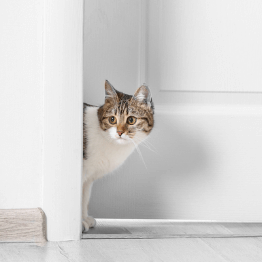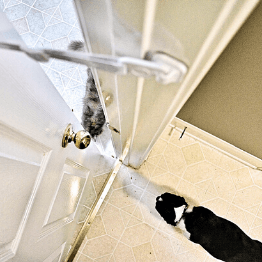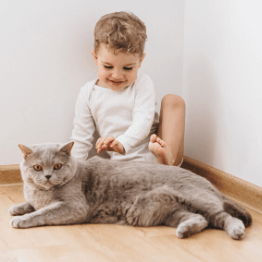ARE CAT PROBIOTICS WORTH IT?
You've probably heard of human probiotics, but did you know you can get probiotics for cats too? That's right! Our feline furbabies also need help with their digestive system sometimes, and cat probiotics work a charm. So, before we get into whether or not probiotics for cats are worth it, let's take a closer look at what exactly cat probiotics are and how they work.
WHAT IS A CAT PROBIOTIC?
Just like in us humans, most of a cat's immunity resides in its digestive tracks. So, keeping this balanced with an array of good bacteria is essential to ensuring your cat stays healthy. A cat probiotic can help you stay on top of your cat's wellbeing by providing friendly bacteria to support digestive health.
The live microorganisms in probiotics for cats are believed to help treat or prevent various illnesses and diseases, especially those related to the gastrointestinal system. But how do you know if you need a cat probiotic for your kitty? What kind of probiotics should you buy for your cat, and how often should you administer them? Keep reading to find out!
TYPES OF CAT PROBIOTICS - HOW DO YOU CHOOSE THE BEST PROBIOTIC FOR CATS?
Cat probiotics come in various forms, including powders, pills, and even infused inside of treats and probiotics in cat food. So, how do you choose the best probiotics for cats? To get the most considerable benefit out of a probiotic supplement for your cat, Dr. Patrick Mahaney, a Los Angeles area veterinarian, suggests opting for the highest CFU (colony forming units) that you can find.
The trick is to ensure you have a diverse array of probiotics and not just one type of bacteria. We'll try not to get too technical, but the strains that cats tend to do best with are those of the Bifidobacterium and Enterococcus families. Bifidobacterium tends to live in the small intestine, whereas Enterococcus generally resides in the colon (large intestine).
Your local vet is a great person to chat to when deciding which are the best probiotics for cats to choose for your furbaby!
WHAT TO LOOK FOR IN CAT PROBIOTICS
Regarding probiotic supplements for kitties, there are so many things to consider and look for to choose the best ones for our cats. Let's take a closer look!
Number and Diversity of Probiotics
Bacterial probiotics are most effective if they are living and not dead. The more bacteria present, the higher the likelihood that the probiotic supplement will benefit your cat. This means you'll want to choose a product with many colony-forming units (think over a billion CFUs) or bacteria.
Since you don't know exactly what kind of bacteria your cat needs, you should also look for probiotic strains that are multi-strain. This means there will be more than one type of beneficial bacteria in the product, ready to help your cat's gut health.
Flavor
Cats can be picky eaters, so the flavor of the probiotic supplements you choose is essential, but not only because of the taste! It's great to have a duck flavored option, but only if it'll help your cat! If your cat has food sensitivities, allergies, or inflammatory bowel disease, check to see if the probiotic contains ingredients your cat cannot tolerate.
Some cat probiotics contain animal digest, animal proteins, grains, and other ingredients that may cause a problem in your cat or are a flavor that your cat will turn its nose up at. If you have a picky eater or a kitty who doesn't respond well to capsules, consider using treats instead to ensure they get a quality dose of essential probiotic strains.
Storage Requirements
Since bacterial probiotics are living and need to be viable when you give them to your cat, storing them properly is vital! Some probiotics require refrigeration, others need to stay below 77 degrees (F), and some may not have any temperature requirements at all.
To ensure your probiotic may benefit and help your cat's overall health, look for and follow the storage recommendations on the package. This may differ depending on the types of probiotics.
Delivery Method
Different types of probiotics will have different delivery methods, so finding one that works best for your cat will help you and them! Probiotics for cats commonly come in a powdered form, designed to be sprinkled on top of your cat's food or mixed with water to syringe into your cat's mouth.
Other options come in the form of digestible capsules. Capsules can typically be given as a tablet (although, pet parents, have you ever tried to give a cat a pill?!) or opened to sprinkle the contents onto the cat's food or have the contents mixed into water to syringe into your cat's mouth.
If you find probiotics for cats that come in the form of treats or food, these might work better for your kitty. At the end of the day, it's what fits into your cat's diet the best and helps their pet parents keep them healthy with good gut bacteria.
The Age (and Size) of your Cat
The age and size of your cat will play a role in how many probiotics they need for healthy gut bacteria. Younger or smaller cats might have a hard time consuming large amounts of a probiotic, so the quantity of product needed to deliver a beneficial amount of the probiotics will matter.
Elderly cats that don't eat much may also respond better to a product where you don't have to give a lot of powder or paste. Probiotics can help cats of all shapes and sizes, but we need to provide them with the correct quantities for overall digestive and immune system health.
Health Issues
Did you know that certain types of probiotics have been studied to support specific bodily systems? This means that your cat might benefit more from one probiotic than another, depending on what type of health condition it has and what kind of bacteria are in the product you choose.
If your cat does have a health condition or any digestive issues, we'd suggest always talking to your veterinarian before introducing a new probiotic to your cat's treatment plan.
WHAT ARE THE BENEFITS OF PROBIOTICS FOR CATS?
Daily use of feline probiotics helps support a healthy gut microbiota which helps keep your cat happy and healthy. Here are a few of the benefits of probiotics for cats:
- Improved stool quality, with firmer and fewer stools
- Support the development and maintenance of healthy immune systems
- Aids in your cat's digestive health, helping to breakdown food and absorb nutrients
- Help with weight management
- Help to halt diarrhea, reseed the gut with beneficial bacteria, improve digestion, and boost immunity
- Promote and support healthy gut bacteria
In addition to the above, probiotics have been suggested to aid in treating cats with flatulence, persistent E. Coli Urinary Tract Infections, acute diarrhea, acute pancreatitis, hemorrhagic gastroenteritis, colitis, inflammatory bowel disease, and chronic inflammatory enteropathies.
HOW DO YOU GIVE YOUR CAT PROBIOTICS?
Unlike giving your cat pills, giving them probiotics doesn't need to be im-paw-sible! Because feline probiotics come in many different forms, you'll want to choose one that works best for your cat. Maybe it prefers it to be sprinkled over its food or given through probiotic treats for cats. You can now also get probiotic food for cats.
To administer a dosage, it's best to follow the instructions on the package. After all, we only want to choose the best probiotics for cats! Before giving a probiotic for cats or other supplements, consult your vet to ensure the proper dosage and type for your furbaby.
WHAT ABOUT PROBIOTICS FOR KITTENS?
While it's not always advisable to give cats and kittens the same supplements and food, this isn't the case with probiotics for kittens. You can give your kitten probiotic supplements, which are often helpful if they have diarrhea or tummy issues. You must ensure you use probiotics safe for kittens and the correct dosage.
ARE THERE ANY POTENTIAL SIDE EFFECTS OF A PROBIOTIC FOR CATS?
While too much good bacteria won't hurt your cat, there are a few important tips to keep in mind before feeding your kitty a probiotic supplement.
"Because probiotics contain live bacterial cultures, there is a risk of infection or even a risk that the live cultures could manufacture harmful substances. Because probiotics are not always regulated by the FDA, they could even contain substances other than the intended ingredients," explains Kathryn Primm, DVM, CVPM, owner and chief vet of Applebrook Animal Hospital.
So, when choosing a probiotic supplement for your feline furbaby, it's best to ask your vet which products they trust and can recommend. This is the sure way to help your cat.
SO, ARE PROBIOTICS FOR CATS WORTH IT?
Now that you're a little more informed about probiotics for cats, it's easy to see that they can improve your cat's health and quality of life. However, you'll still want to check with your vet before deciding to give your cat a probiotic supplement. With a balanced diet and regular exercise, a probiotic can be the perfect supplement to balance your kitty's digestive system.
Probiotics for cats with diarrhea and to improve your cat's digestive system are also becoming a little more common. If this is something your cat struggles with, be sure to chat with your vet to choose the right probiotic for cats.
5 Vet-Recommended Best Probiotics for Cats
Best Probiotic Cat Food - Hill's Gastrointestinal Biome
If your cat regularly struggles with an upset tummy, this food is for you. While this recipe doesn't contain probiotics, it's packed full of prebiotics—the superfood for the body's natural good bacteria.
You need a prescription to purchase this food, so ask your vet if Hill's GI Biome is suitable for your cat.
Best Daily Probiotic - The Honest Kitchen's Goat Milk
While cow's milk contains a high amount of lactose and can cause digestive upset, goat's milk can do the opposite. It not only has less lactose but also 1.25 billion CFUs per serving.
This probiotic comes in the form of a convenient powder that is easy to store and easy to serve by just adding warm water. Cats tend to love it, making this an easy way to get a daily boost of nutrition.
Best Soft Chew Probiotic Supplement - Doctors Foster and Smith Probiotic Soft Chews for Cats
Veterinarians have developed these cheese-flavored probiotic chews for cats and dogs. The formula includes eight strains of beneficial probiotic bacteria, and the soft chews make the perfect daily treat!
They contain a healthy dose of good bacteria plus prebiotics to kick-start your furry companion's natural production of good bacteria.
Best Powder Supplement - Purina Pro Plan Veterinary Diets FortiFlora Powder Digestive Supplement for Cats
Help settle your cat's sensitive stomach with Purina Pro Plan Veterinary Supplements FortiFlora Feline Probiotic Supplements. This great-tasting probiotic supplement powder is specially formulated to promote normal intestinal microflora and is an effective probiotic for cats with diarrhea.
It is crafted in collaboration with nutritionists, researchers, and veterinarians.
Our Top Pick: Pet Ultimates Probiotic for Cats
Packed with probiotics, Pet Ultimates Probiotic for Cats provides your furbaby with what it needs to support regular digestion and protect its colon against inflammation and infection.
This cat probiotic supplement promotes healthy skin, reduces excess shedding, and supports your cat's overall sense of wellbeing.
Giving your cat a safe place to eat and use the litter box can also help prevent any unnecessary nerves and anxious feelings. This is where Door Buddy can help. Also, if you're giving your feline friend probiotics with cat food, you definitely won't want your doggo tucking into this! Create your very own dog-proof cat feeder with our adjustable pet door strap.













